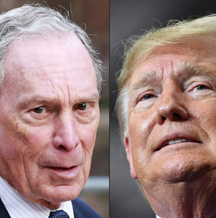One way to critique Michael Bloomberg and Donald Trump is to look at their investments in majority Black and economically challenged Gary, Indiana. The trailblazing steel town just thirty minutes from Chicago elected one of the nation’s first two Black big city mayors in 1967. While many officials in the Black political history making city believe that Trump’s investment in a Gary casino was diced with controversies, officials still praise Bloomberg for his restaurant business incubator, ArtHouse: A Social Kitchen.
Artist Theaster Gates won a $1 million Bloomberg Philanthropies Public Art Challenge in 2015 and opened the incubator across the street from the new downtown baseball park. When he applied, Gates was concerned that years of disinvestment had left the city’s nearly 80,000 residents with only 30 restaurants, and he hoped to train culinary entrepreneurs who could open new businesses across the Steel City, which is home of the Indiana Dunes National Park.
Former Gary mayor Karen Freeman-Wilson told the Northwest Indiana Times that the culinary incubator has yielded some successes, such as training the entrepreneurs behind Foody's restaurant and Love Tea, which is made in Gary and sold in nearly a dozen Chicago restaurants. The ArtHouse is now looking for a way to become sustainable after the grant funding runs out. “What they are attempting to do is good for the community,” Foody’s co-owner John Allen told Port Of Harlem.
Generally, Gary officials have had the opposite experience with the current president. His shaky relationship started when city officials rejected his bid to get one of two casinos licenses. It was the State of Indiana that overruled local officials. "We did not see the capability at that time of him delivering on what he had promised," said then Gary mayor Thomas Barnes. Trump was, however, Gary’s third choice, if another license became available.
Trump was "surprised and shocked" to have been jilted by the majority Black city. According to transcripts and reported by the Indianapolis Star, he told Indiana officials on September 1, 1994, "One of the things I'm most proud of is the fact that virtually every jurisdiction wants us. We turn down lots of jurisdictions. Most of the time, we turn them down. Sometimes, we'll go there and look and we'll turn them down."
Bloomberg versus Trump

Don Barden, who was African-American, got the other license with the city’s full blessings. He and Trump were charged to work together, but creating harmony with the man who would become the president with only one Black in his cabinet was not easy for Barden. "I have been extremely unfairly treated by another gentleman," Trump told state officials, referring to Barden.
Generally, Gary officials have had the opposite experience with the current president. His relationship started when city officials rejected his bid to get one of two casinos licenses.
Nevertheless, the Trump-Barden partnership didn't last long. Trump's casino subsidiary filed for Chapter 11 bankruptcy in 2004, seeking to restructure $1.8 billion in debt. Trump sold his stake in the Gary casino venture to Barden's company for $253 million in November 2005. Trump did, however, invest more than $100 million to open Trump Casino, donated money for causes ranging from police cars to fireworks shows and brought the Miss USA Pageant to Gary in 2000 and 2001, both covered by Port Of Harlem.
However, the city’s biggest grip was his promise to tear down an old hotel, which he never did. While the former Gary mayor who succeeded Barnes, Scott King, says to the Indianapolis Star that Trump meet his commitments, the latest former mayor, Freeman-Wilson, had a differing opinion. "I don't know that I would call it a broken promise because Gary kind of let (Trump) out of the deal. I'm sure if you were talking from Trump's perspective, it would be a renegotiated deal. From my perspective as a citizen, I'd call it a bait-and-switch."
Generally, Gary officials have had the opposite experience with the current president. His relationship started when city officials rejected his bid to get one of two casinos licenses.
Nevertheless, the Trump-Barden partnership didn't last long. Trump's casino subsidiary filed for Chapter 11 bankruptcy in 2004, seeking to restructure $1.8 billion in debt. Trump sold his stake in the Gary casino venture to Barden's company for $253 million in November 2005. Trump did, however, invest more than $100 million to open Trump Casino, donated money for causes ranging from police cars to fireworks shows and brought the Miss USA Pageant to Gary in 2000 and 2001, both covered by Port Of Harlem.
However, the city’s biggest grip was his promise to tear down an old hotel, which he never did. While the former Gary mayor who succeeded Barnes, Scott King, says to the Indianapolis Star that Trump meet his commitments, the latest former mayor, Freeman-Wilson, had a differing opinion. "I don't know that I would call it a broken promise because Gary kind of let (Trump) out of the deal. I'm sure if you were talking from Trump's perspective, it would be a renegotiated deal. From my perspective as a citizen, I'd call it a bait-and-switch."
Advertisers | Contact Us | Events | Links | Media Kit | Our Company | Payments Pier
Press Room | Print Cover Stories Archives | Electronic Issues and Talk Radio Archives | Writer's Guidelines






